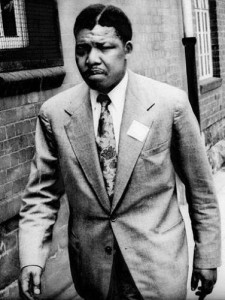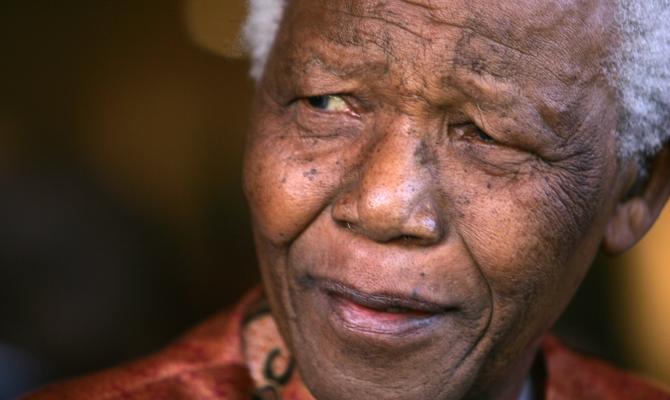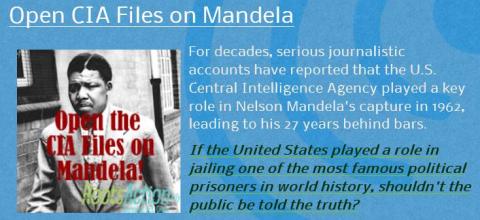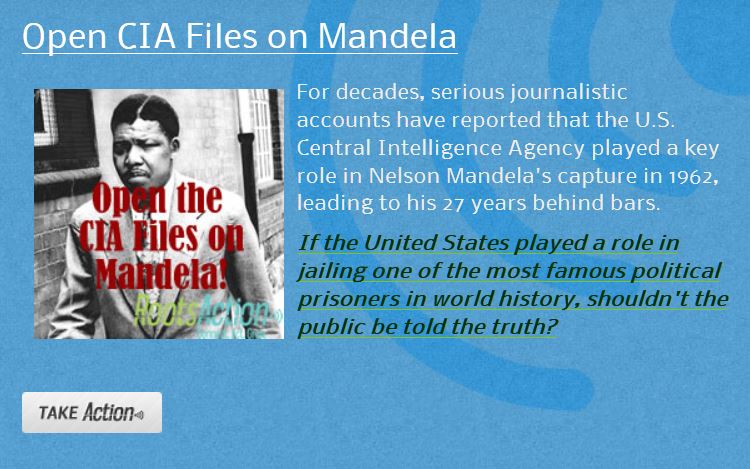- CIA and Mandela: Can the Story Be Told Now? (Fairness & Accuracy in Reporting)
- The Day Mandela Was Arrested, With A Little Help From the CIA (Jeff Stein)
- Open CIA Files on Mandela - Sign the Petition (RootsAction)
CIA and Mandela: Can the Story Be Told Now?
Agency's role in Mandela capture still mostly not news
By Fairness & Accuracy in Reporting
December 10, 2013
FAIR - Fairness & Accuracy in Reporting
Back in 1990, FAIR (Extra!, 3/90) noted that the media coverage of Nelson Mandela's release from prison failed to mention there was strong evidence that the CIA had tipped off South African authorities to Mandela's location in 1962, resulting in his arrest.
So with coverage of Mandela's death dominating the media now, can the story of the CIA's role in Mandela's capture be told?
Mostly not.
The link between the CIA and Mandela's capture--reported by CBS Evening News (8/5/86) and in a New York Times column by Andrew Cockburn (10/13/86) --was almost entirely unmentioned in media discussions of his death.

There were a few exceptions. MSNBC host Chris Hayes mentioned it on December 5 ("We know there's reporting that indicates the CIA actually helped the South African police nab Mandela the first time he was captured"). On Melissa Harris-Perry's MSNBC show (12/7/13), Democracy Now! host Amy Goodman brought it up:
The US devoted more resources to finding Mandela to hand over to the apartheid forces than the apartheid forces themselves. It was the CIA that actually located Mandela, and he was driving dressed up as a chauffeur when he was stopped, and he was arrested and ultimately serves 27 years in prison.
And on CNN's Outfront (12/6/13), Cornel West told guest host Jake Tapper, "Keep in mind, though, Brother Jake, the CIA colluded with the apartheid regime to find Nelson Mandela when he was disguised as a chauffeur in 1961."
So the lesson might be that the kinds of guests rarely included in corporate media are the ones more likely to bring up this history.
In the New York Times' long obituary (12/6/13), Bill Keller presented it as a story that is yet to be confirmed: "There have been allegations, neither substantiated nor dispelled, that a CIA agent had tipped the police officers who arrested Mr. Mandela." He reiterated that on NPR's Morning Edition (12/6/13): "I have not seen utterly convincing confirmation or refutation of it."
Keller--who was convinced about Iraq's WMDs--has presumably read the accounts of CIA involvement in Mandela's capture, including a Cox News Service report (6/10/90) of a retired CIA official admitting that a CIA operative told him of the operation ("We have turned Mandela over to the South African security branch") the day it happened.
So with Mandela's death making headlines everywhere, there is still very little coverage of this part of the Mandela story. One place you can find it, though--the New York Times letters to the editor section today (12/10/13), where this appears under the headline "CIA and Mandela's Arrest":
To the Editor:
Nelson Mandela's membership in the South African Communist Party in the early 1960s was acknowledged by the Communist Party itself last week, confirming the findings of my own historical research, reported by Bill Keller ("Nelson Mandela, Communist," column, Dec. 8).
Perhaps the United States government will now confirm the role of the Central Intelligence Agency in Mr. Mandela's arrest in August 1962, which is also indicated by my research. It was the height of the Cold War, and it was all a long time ago, but the truth still counts.
Stephen Ellis Amsterdam, December 9, 2013
"The truth still counts" shouldn't just guide government decisions about what it chooses to reveal about its own history. It's something journalists should consider too. Much of the coverage of Mandela is focused on his remarkable ability to forgive his opponents. It would be especially useful for US media to spell out which US government actions might have to be forgiven.
The Day Mandela Was Arrested, With A Little Help From the CIA
By Jeff Stein
December 5, 2013
Newsweek

A CIA agent fingered Mandela for the apartheid regime's secret police.
credit - Newsweek // REUTERS/Mike Hutchings MH/DBP
One of the great things about the late great Nelson Mandela is that he didn't hold grudges.
How else could he have accepted normal relations with the CIA, which tipped off the white-supremacy regime to his whereabouts in 1962?
According to a 1990 Johannesburg Sunday Times newspaper account, a CIA agent by the name of Millard Shirley fingered Mandela for the apartheid regime's secret police, allowing them to throw up a roadblock and capture him.
"Shirley had a high-ranking `deep throat,' a Durban-based Indian, within South African Communist party ranks," Gerard Ludi, a retired senior South African intelligence agent told the paper.
"I can only guess that Shirley was instructed by his government to supply the information to the South Africans because it was in America's interest to have Mr. Mandela out of the way."
A dozen years later, Ludi told me in 1996, he went into business with Shirley, who had officially retired from the CIA. Naturally, they ran a private security business.
Then, in 1985, came the call from a secret South African government unit called Stratcom (Strategic Communications), whose function was to disrupt and destroy anti-apartheid groups, I reported for Salon. Shirley was hired to train the unit's operatives and develop a covert operations training manual.
My Salon story continued:
"The South African intelligence services didn't have decent training materials," Ludi said. "They asked Millard to update and do a proper training manual. He did it for a year off and on for a year."
Asked whether his friend was still working for the CIA at that point, Ludi answered, "Who knows? Shirley tried to retire many times, but the CIA kept calling him back to duty. We gave him about 20 retirement parties."
According to Mike Leach, who also worked for Stratcom, the manuals used by Shirley had U.S. Department of Defense stamped on their covers. But Shirley's activities went beyond designing training manuals, according to Leach.
"One of the things Shirley did during the negotiations with unions was to doctor the water on the table with chemicals to induce stomach cramps, to bring about a point where the union officials would want to hurry up the negotiations and just settle because they were physically uncomfortable."
Another trick was to launder anti-apartheid T-shirts in a fiberglass solution and hand them out to demonstrators, who would soon be convulsed in uncontrollable itching.
The Stratcom unit also intercepted foreign donations to anti-apartheid groups, then sent back thank-you notes on phony letterheads and put the money into more "psychological warfare operations," said Leach.
The CIA's involvement in these activities is unclear, but Leach claims the agency sent South Africans to a facility in Taiwan for advanced psychological warfare training. The Telcom auditing official called the CIA's alleged wiretap training "very sinister." He suspects the CIA used the program to develop its own spies in Telcom, to protect its assets in the country at this time.
"The American government wanted to know which way the cookie would crumble," he said
Open CIA Files on Mandela - Sign the Petition
Click here to sign petition to your Congressional representative and Senators



Spread the word